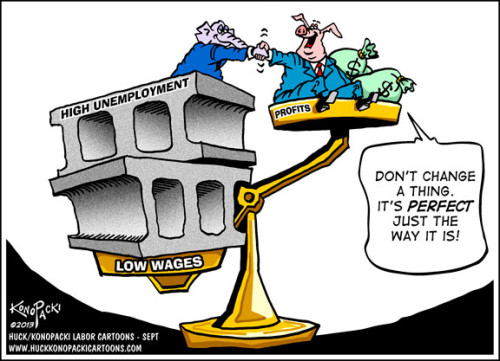GOP loves high unemployment
Cartoonist note: I found this editorial in M.B Schnapper’s American Labor: A Pictorial Social History.
Even the capitalist press in the depression knew that the bosses weren’t the least bit interested in being “job creators.”
ARE U.S. BUSINESS LEADERS MORONS?
Forbes Magazine from April, 1930
ARE our business leaders morons?
Are they incapable of meeting evils begotten by their own activities?
Must they be regarded as irresponsible citizens, concerned only with money-making?
Are they willing to be accepted and adjudged as incapable of exercising business statesmanship?
Do our industrialists, financiers and other men of large affairs rate themselves as less competent than our politicians to grapple with social problems created by the economic revolution now under way?
Have those playing a foremost part in revolutionizing modern industry no qualms about making such a confession as this:
“Business is business. The objective of industry is to make money. We are determined to make money. We concentrate solely on that aim. If we are satisfied that a billion-dollar merger will mean greater profits, we go ahead and engineer it.
“One of the easiest ways to cut down expenses being to cut down salary and wage rolls, we of course lay men off right and left. If elderly workers have become less nimble because of their long years of service, they are the logical ones to be dropped first. Naturally, the greater resources at the command of the enlarged combinations are unstintedly used to acquire the very latest labor-saving machinery, enabling us to dismiss still more wage earners.
“In our eyes the most valuable executive is the one who can produce the most with the least amount of labor—the smallest number of workers and the smallest payroll. Our up-to-the-minute methods make it feasible for us to dispense with enormous numbers of workers—it is not uncommon for us to install one machine which enables half-a-dozen men to do what formerly took half-a-hundred or even a hundred men.
“Yes, we know that through our creation of gigantic enterprises—manufacturing, distributing, retailing and every other kind-and through our vast expenditures on research, on invention, on machinery, we have caused grave dislocation of employment; but instead of being criticized for all this technological unemployment, we should be commended, since it is conclusive proof of our mastery of the science of management. What happens to all the hordes of workers we release is not our concern. Our responsibility begins and ends with running our business with surpassing efficiency, which means with a minimum of human labor.
“No, the unemployment thus created does not enter in any way into our calculations. Our bounden duty is to exercise every ounce of ingenuity we possess to do away with jobs, not to create them. Our objective is money, more and more money, not more and more men, but fewer and fewer men.
“We are much too engrossed in increasing profits to give a thought to what happens because of our reducing the number of workers. How to take care of unemployment is a problem for others to solve. Let George do that. Politicians talk as if they know how to solve the problem. Very well, let them go ahead and do it. Anyway, we haven’t the time to bother with it. It isn’t our worry.”
American industry may disclaim that it talks that way but it cannot disclaim that, collectively, it has acted that way.
Industry hasn’t one organization, representing its best brains, devoting itself seriously, systematically, scientific ally, to handling the whole subject of employment and unemployment.
There is no co-ordinated machinery for co-operating with the workless to find work. Industry feels perfectly free to dismiss breadwinners by the hundred and by the thousand without giving a thought as to how these breadwinners may succeed or fail in earning bread for themselves and their families.
This far-reaching evil cannot be airily dismissed with the superficial remark, “Panics always cause unemployment. There will soon be work for all.”
The disturbing truth is that our economic revolution had released an abnormal number of workers even during our period of greatest prosperity. It is a commentary upon how this whole problem has been neglected that neither government nor industry has taken the pains even to keep track of the extent of unemployment from month to month, from season to season. It has been nobody’s business to lie awake cogitating what happens to breadwinners denied opportunity to earn their bread.
Let industry take heed of this warning, written on the wall in starkly clear handwriting:
If industry itself confesses its indifference or its inability to wrestle with the problem of unemployment, including the older workers, depend upon it that the politicians will step in.
FORBES implores the best brains in industry and finance and business to get together before public opinion induces the politicians to institute drastic measures. We still have more faith in America’s business statesmanship than in America’s political statesmanship.


This is the first time I’ve seen the true feelings of corporate reality, in print. Amazing!